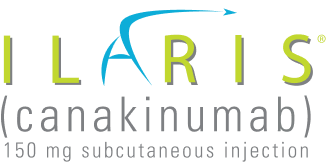
Still's Criteria
Not an actual patient. Individual results will vary.
ILAR classification criteria for systemic juvenile idiopathic arthritis (SJIA)
| Inclusion Criteria for ILAR1,2 | Exclusion Criteria for ILAR1 |
Arthritis affecting ≥1 joint for ≥6 weeks with or preceded by fever for ≥2 weeks occurring daily for ≥3 days, plus one or more of the following:
|
|
Common laboratory abnormalities:
- Highly elevated inflammatory markers such as ESR and CRP are usually present in patients with SJIA3
Diagnosing AOSD based on the Yamaguchi criteria (requires ≥5 criteria, including ≥2 major criteria)4
| Major Criteria (≥2 Required)4 | Minor Criteria4 | Exclusion Criteria4 |
|
|
|
Several common laboratory abnormalities include5,6:
- Elevated ESR and CRP
- Leukocytosis
- Thrombocytosis
- Elevated ferritin levels, 5x upper limit of normal
- Glycosylated ferritin is an important marker—in patients with AOSD, glycosylation of ferritin is often <20%
Despite progress in understanding Still’s disease, achieving treatment goals may be challenging5
Treatment goals for Still’s disease include3,7,8:
- Remission across arthritic and systemic manifestations
- No long-term steroid use
- Prevention of future complications and irreversible disability
Long-term steroid use and the long-term effects of Still’s disease can negatively impact patients9-12
Consequences of long-term steroid use
- Approximately 40% of patients with AOSD, the adult form of Still’s disease, are dependent on steroids, exposing them to serious side effects10
Long-term systemic complications
- Uncontrolled systemic inflammation from Still’s disease may lead to life-threatening complications and chronic disabilities11
- Up to 14% of adult patients with Still’s disease experience macrophage activation syndrome (MAS), which is often associated with death11,12
- Other complications may include11,12:
- Joint erosion
- Cardiopulmonary disease
- In rare cases, disseminated intravascular coagulation and end-organ damage to the liver and kidneys
References: 1. Petty RE, Southwood TR, Manners P, et al. International League of Associations for Rheumatology classification of juvenile idiopathic arthritis: second revision, Edmonton, 2001. J Rheumatol. 2004;31(2):390-392. 2. Ringold S, Weiss PF, Beukelman T, et al; American College of Rheumatology. 2013 update of the 2011 American College of Rheumatology recommendations for the treatment of juvenile idiopathic arthritis: recommendations for the medical therapy of children with systemic juvenile idiopathic arthritis and tuberculosis screening among children receiving biologic medications. Arthritis Rheum. 2013;65(10):2499-2512. doi:10.1002/art.38092 3. Lee JJY, Schneider R. Systemic juvenile idiopathic arthritis. Pediatr Clin North Am. 2018;65(4):691-709. doi:10.1016/j.pcl.2018.04.005 4. Yamaguchi M, Ohta A, Tsunematsu T, et al. Preliminary criteria for classification of adult Still’s disease. J Rheumatol.1992;19(3):424-430. 5. Efthimiou P, Paik PK, Bielory L. Diagnosis and management of adult onset Still’s disease. Ann Rheum Dis. 2006;65(5):564-572. doi:10.1136/ard.2005.042143 6. Giacomelli R, Ruscitti P, Shoenfeld Y. A comprehensive review on adult onset Still’s disease. J Autoimmun. 2018;93:24-36. doi:10.1016/j.jaut.2018.07.018 7. Tomaras S, Goetzke CC, Kallinich T, Feist E. Adult-onset Still’s disease: clinical aspects and therapeutic approach. J Clin Med. 2021;10(4):733. doi:10.3390/jcm10040733 8. Macovei LA, Burlui A, Bratoiu I, et al. Adult-onset Still’s disease—a complex disease, a challenging treatment. Int J Mol Sci. 2023;23(21):12810. doi:10.3390/ijms232112810 9. Ma Y, Meng J, Jia J, et al. Current and emerging biological therapy in adult-onset Still’s disease. Rheumatology (Oxford). 2021;60(9):3986-4000. doi:10.1093/rheumatology/keab485 10. Gerfaud-Valentin M, Jamilloux Y, Iwaz J, Séve P. Adult-onset Still’s disease. Autoimmun Rev. 2014;13:708-722. 11. Efthimiou P, Kontzias A, Hur P, Rodha K, Ramakrishna GS, Nakasato P. Adult-onset Still’s disease in focus: clinical manifestations, diagnosis, treatment, and unmet needs in the era of targeted therapies. Semin Arthritis Rheum. 2021;51(4):858-874. doi:10.1016/j.semarthrit.2021.06.004 12. Efthimiou P, Kadavath S, Mehta B. Life-threatening complications of adult-onset Still’s disease. Clin Rheumatol. 2014;33(3):305-314. doi:10.1007/s10067-014-2487-4
